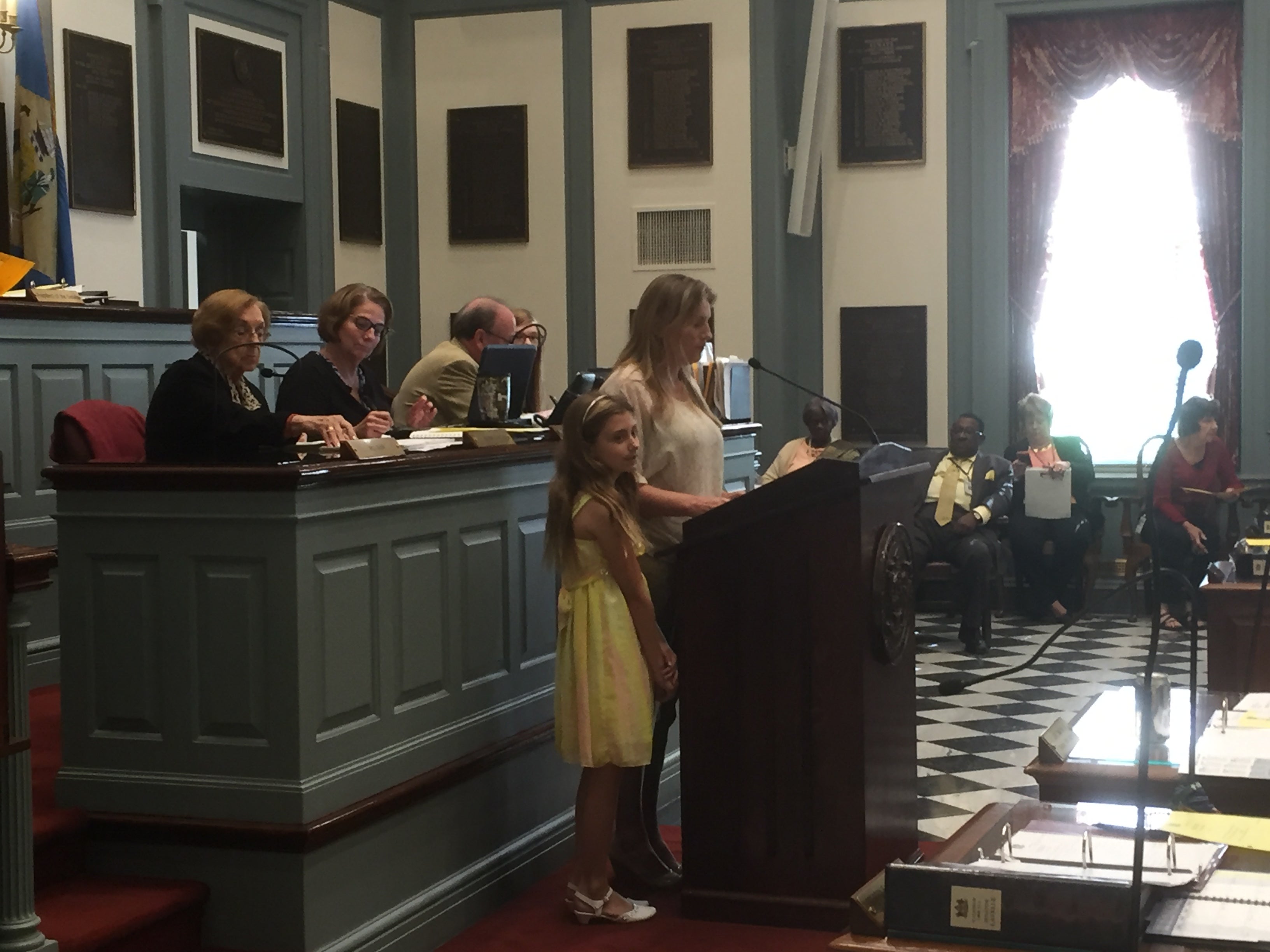Delaware Senate passes bill allowing access to medicinal marijuana at school

Rylie Maedler and her mother
Legislation that would allow school students to use medicinal marijuana on school property is one step closer to passing in the Delaware General Assembly.
Legislation that would allow Delaware children who legally use medicinal marijuana oil for their illnesses to have access to their medicine on school property is one step closer to being signed into law.
The Senate passed Senate Bill 181, sponsored by State Sen. Ernie Lopez, R-Lewes, with a unanimous vote on Thursday. It must pass in the House before it can be signed by Gov. Jack Markell, D-Delaware.
“This was something extremely important,” Lopez said. “It’s very bi-partisan, and in these divisive times it’s so good to serve the people in a body that shows everyone out there that when it comes to children’s health we work on a bi-partisan basis and that’s what’s it all about at the end of the day.”
Last year Lopez introduced legislation that expanded the use of medicinal marijuana oil to those under 18, if they have intractable epilepsy and certain muscle disorders. The legislation known as “Rylie’s Law” passed in the Senate and the House almost unanimously with one legislator absent.
Medicinal marijuana experts say oils do not cause the consumer to become high, and are a safe option for children with various medical conditions.
Lopez’s new bill would allow for minors with a state-issued medical card to have access to cannabis oils on school property.
An amendment introduced this week makes clear the person administering the medical marijuana oil is not affiliated with the school, unless a parent or legal guardian of the child.
“I think everyone understands as important as Riley’s Law was last year in regards to making this legal, improving access was a key component we wanted to get done this year,” Lopez said.
Delawareans over 18 have been able to receive doctor-recommended medicinal marijuana with a state-issued ID since July 2012.
If a doctor concludes their patient has one of the qualifying conditions they can sign off on the ID, and then the patient can take the ID to the state-run dispensary in Wilmington to receive the medication.
The Division of Public Health, which oversees the First State Compassion Center dispensary, plans to complete contract negotiations for two new centers in Kent and Sussex counties by the end of summer.
According to the Division of Public Health there currently are 1,550 card holders in the state, and it expects an increase. Currently only 0.3 percent of Delawareans under 18 hold the ID card. The largest percentage, 28.3 percent, are between the ages of 51 and 60.
There are several current qualifying conditions for adults, including cancer, HIV/AIDS and intractable epilepsy.
“Rylie’s Law” was named after Rylie Maedler, who, in 2013, was diagnosed with aggressive giant cell granuloma, which are bone consuming tumors in the face. Two weeks after undergoing a seven-hour surgery, Rylie, now 10, began having episodes that were later diagnosed as seizures. The medications she received caused severe mood changes, depression and bone pain.
While researching treatment options, Rylie’s mother Janie Maedler learned about cannabis oil. She joined a support group and Rylie began using it not long after her surgery.
After using the treatment, Maedler said her daughter made major improvements. She then started to slowly ween her off the drug, but her seizures became worse. That’s when she contacted Lopez in an effort to legalize the oil for those under 18. Riley’s seizures are now at 90 percent control.
Before Thursday’s vote on Lopez’s new legislation, Maedler held back tears as she described how even though her daughter is healthier, she still has to face harsh weather conditions while leaving school to take her medication, sometimes misses classes and at times, feels like an outsider. She said he son Gavin, who takes medication on school property, is asked by peers why his sister has to leave school.
“She may physically be more normal now, but she doesn’t seem normal to her peers when she has to leave school property every day,” Maedler said.
After the Senate voted in favor of the legislation Rylie said she was delighted by the results.
“I feel really happy, and I’m kind of feeling positive for the House representatives,” she said.
“If I take it inside school it will be less time away from class and it would be easy to walk down the hall and get the medicine, then I wouldn’t have to get wet or in really bad storms and I wouldn’t be losing my place in class.”
The legislation likely will move on to the House next Thursday, and Lopez said he expects it to pass.
“We need to do everything we possibly can to improve their health and their quality of life, and it’s very humbling for me to see everyone come together and get that done today,” he said.
WHYY is your source for fact-based, in-depth journalism and information. As a nonprofit organization, we rely on financial support from readers like you. Please give today.





